Croatia's Coronavirus Update: 766 New Cases, 80 Deaths, 3,208 Recoveries
ZAGREB, Dec 21, 2020 - In the last 24 hours, of 4,614 performed for coronavirus, 766 have returned positive (16.6%), and there have been 80 COVID-related deaths, bringing the death toll to 3,257, Croatia's COVID-19 crisis management team reported on Monday morning.
There are currently 16,105 active cases, including 2,956 patients who are receiving hospital treatment. Of them 294 are placed on ventilators.
Since February 25, when Croatia registered its first case of the infection, a total of 195,728 people have contracted the novel coronavirus, and of them, 176,366 have recovered including 3,208 who have recovered from the disease in the last 24 hours.
There are currently 50,799 people in self-isolation.
Since the outbreak of the epidemic, Croatia has conducted 955,255 coronavirus tests.
Croatia Registers 1,975 New Coronavirus Infections, 76 Deaths
ZAGREB, Dec 20, 2020 - Over the past 24 hours, Croatia has registered 1,975 new cases of the coronavirus infection and 76 deaths, the national COVID-19 crisis management team said on Sunday.
The number of active cases in Croatia today stands at 18,627, including 2,976 COVID patients in hospitals, 290 of whom are on ventilators.
Since February 25, when Croatia registered its first case of the infection, a total of 194,962 people have contracted the novel coronavirus, 3,177 of them have died, and 173,158 have recovered, including 3,390 in the last 24 hours.
There are currently 55,417 people in self-isolation.
To date, 950,611 people have been tested, 9,191 of whom over the past 24 hours.
Nenad Bakic: Why Has the Virus Become So Deadly in the New EU Countries?
December 20, 2020 – The European Union has so far recorded over 300,000 deaths caused by the coronavirus pandemic, with the second wave being 50 percent more deadly than the first one. It is easily possible that the total number will exceed half a million by the time the pandemic is brought under control. Mathematician, investor, and analyst Nenad Bakic explains why for Index.hr.
In terms of the number of deaths per million inhabitants, the new members of the European Union, the countries of the "new European Union", namely the former socialist countries – including, unfortunately, Croatia – are in the lead. Some of them have several tens of times more deaths in the second wave than in the first.
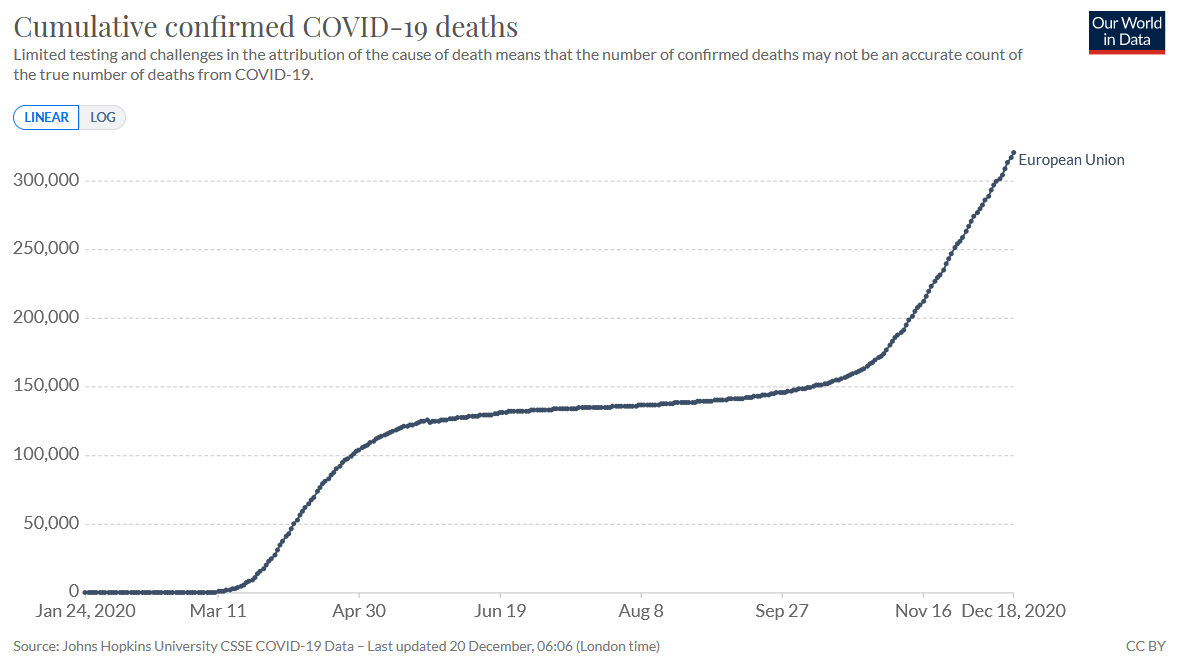
Confirmed cases of death due to coronavirus in the European Union / Source: ourworldindata.org
What is happening? Why did the virus in the second wave become so deadly in the new European Union members? By studying this example, we can learn a lot about the pandemic in general.
- The countries of the New European Union (NE), 11 ex-socialist countries, did very well in the first wave, with only one of them among the 13 most-affected. All the governments of these countries attributed the success to themselves. In some countries like Croatia, it was done by gurus who considered themselves ideologues of barbaric imprisonment or, as they ignorantly called it, "quarantine".
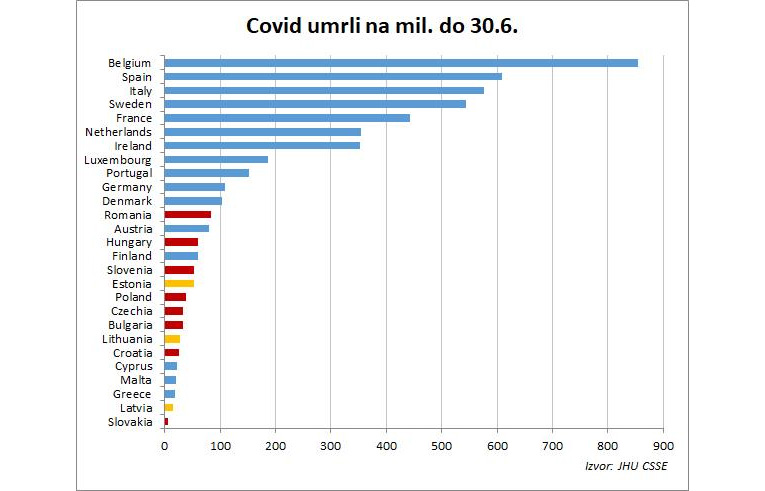
Graph 1. Coronavirus deaths per million, until June 30, 2020. Source: Index.hr / JHU CSSE
They are marked in red on the first graph. A lighter shade highlights the small Baltic countries because something strange is happening there, but it doesn't matter. It is the same when we look at it without this separation.
What is the probability that the NE countries were so much more successful in their will than the older, smarter, and more experienced brothers? Maybe it's something else.
- In the second wave, NE countries were significantly more affected, as we can see in the second graph.
Graph 2. Coronavirus deaths per million, from July 1, 2020 until December 18, 2020. Source: Index.hr / JHU CSSE
Out of the top 8 countries, they occupy seven positions. What is the probability that they are so much more unsuccessful than other countries by their own will? Very small.
Of course, it's easy to recognize a "return to the core value" here – as the virus does what it wants, most countries end up converging to a similar number of deaths. Graph 3 shows the coefficient of variation, which is the standard measure of a set's scatter.
Graph 3. Coefficient of variation, deaths from coronavirus in EU countries per million. Source: Index.hr
Here we can already conclude that the performance of the NE countries as a group has nothing to do with their governments' competencies. The probability that a group with its ability is far above average and then that same group is far below average, especially in a situation like this where the virus spreads across the continent without knowing the boundaries, is zero. Of course, some individual countries are better or worse, both in epidemic management and in treatment.
- But things are only now becoming very interesting. The number of deaths in the second wave not only offset the one from the first wave but also shifted it. The NE countries as a group are now considerably worse than the rest, as we can see in Graph 4.
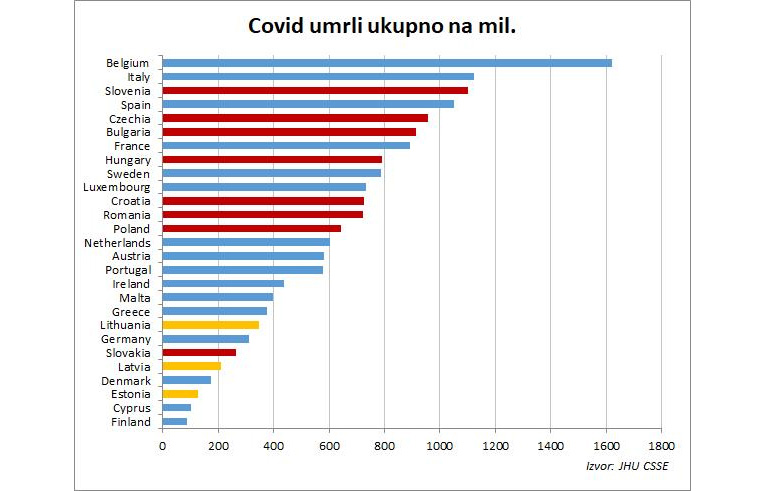
Graph 4. Total coronavirus deaths per million. Source: Index.hr / JHU CSSE
They occupy eight of the first 13 places. If we exclude the small Baltic countries, only Slovakia remains in the lower half, but the situation deteriorates quickly, and it could easily get to the upper half.
As we can see, there is something special about the small Baltic countries and Finland. We still don't know what, and it doesn't matter for this analysis either. If we single out those countries, things become clearer, but the analysis works without them.
- What is the explanation? It can be the following:
- A. It has been shown that COVID-19 is highly seasonal. In NE countries, the epidemic came later in late winter 2020 and therefore could have done much less damage by the time spring came. This is undoubtedly the case with Croatia, as you can see in Graph 5: the reproductive factor R fell below 1 already before the end of March, before the measures were introduced on March 23 in Croatia and could take effect.
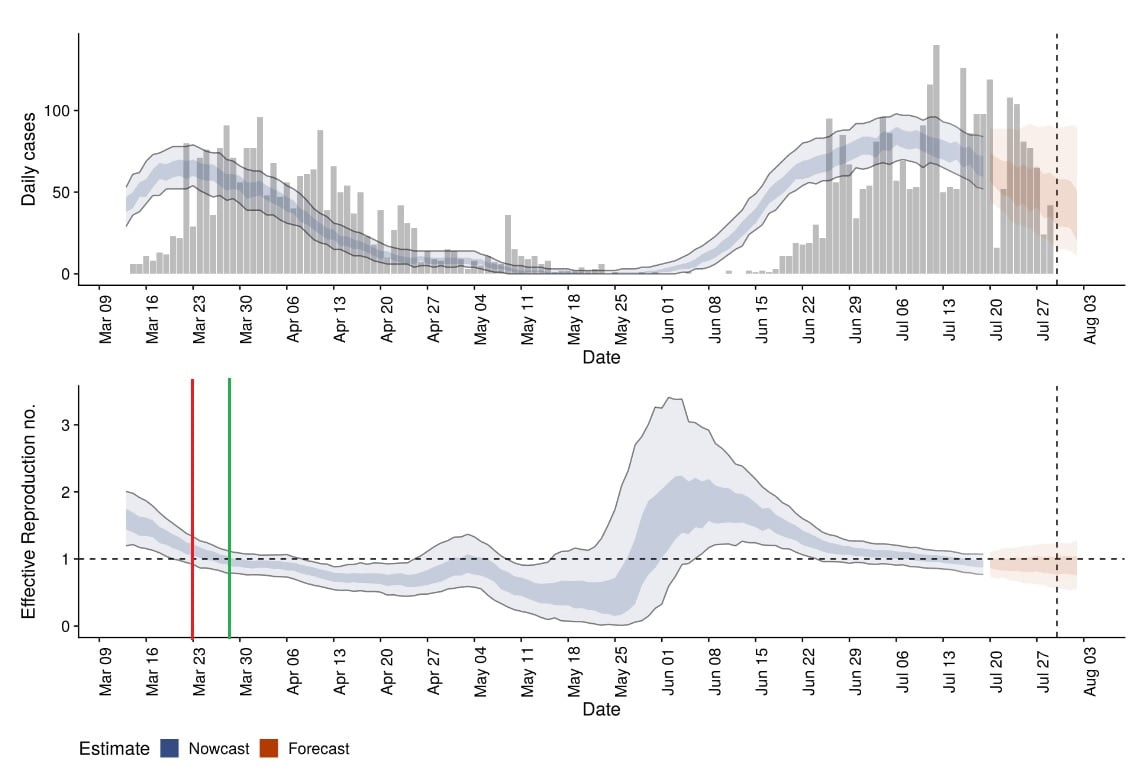
Graph 5. Source: Index.hr
The introduction of a movement prohibition and a drop in R below 1 are marked with a red and green line. An international group of the London School of Health and Tropical Medicine made this calculation, in which a member of the Croatian Scientific Council also participated. Somehow they later forgot to let us know that R had already fallen below 1 even then. However, at the beginning of the epidemic, everything was explained with its help, which advanced countries are doing now. From a time perspective, all of this is now obvious, and that first wave seems completely benign compared to this one now.
But let's remember the psychosis in which we lived then when the concept of "Camp Croatia" with GPS tracking and leaving the house every third or fifth day was already announced when the epidemic was already falling. Inexperienced and impressed by the violent measures, we thought they helped.
But why did the epidemic come later? Here I think the key is in international connectivity. I used an imperfect DHL connectivity index and got a great explanation of the difference, which can be seen in the following chart.
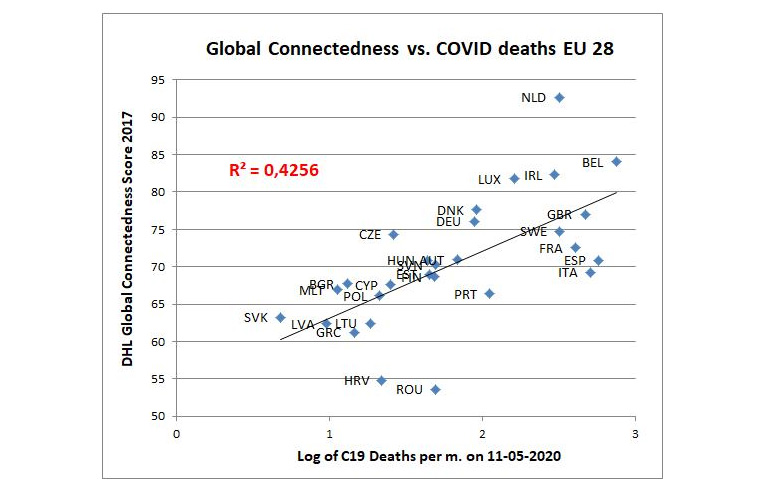
Graph 6. Source: Index.hr
Interestingly, even such an imperfect measure of connectivity explains so much of the variation. As we know, the most affected countries are also the most connected: Italy – densely populated Lombardy and workers from China; Italy, France, Spain – tourism; Belgium – the center of the European Union and others; Sweden – far more connected than its neighbors; and a million Swedes went on school holidays abroad in the last week of February.
- B. The first wave was actually far stronger than it seems now because we tested and hunted cases much less. Many countries found that their dark number (undiscovered cases) was several tens of times higher than those found. In our country, depending on the interpretation of the data, 50 to 80 times, in Denmark 80 (at some point). Now the dark number is probably 5 to 10 in most countries, and the current maybe even just 3 because as more and more people are being tested, and more and more people have been exposed to the virus, the significant dark number has nowhere to hide.
Therefore, most of the countries of old Europe became infected in the spring, a part of the population gained immunity, and significantly more than in the NE, which we cannot see well if we look only at the cases.
- C. It is now quite clear that strongly seasonal is not only an epidemic of SARS-CoV-2 virus but also COVID-19 disease. Clinical pictures are, on average, far more difficult now than a month or two ago. Mortality rates in most EU countries have doubled in just a month or two, meaning twice as many people die among those confirmed infected. It is also the insight of an international group of scientists in which Croatians Gordan Lauc, Alemka Markotić, Dragan Primorac, and others also participated. At first, it was controversial, but now it is generally accepted. Those infected in spring (more in the old than in the NE) had a much better chance of surviving.
- D. One explanation indeed lies in the quality of hospital systems. I believe richer countries have more resources. For example, expensive HFOT devices save lives better than respirators (Croatia has now procured a larger quantity).
- E. Other variables could be considered, such as previous flu seasons, the percentage in the population over 80, or the people in nursing homes. Still, I believe they would indicate a lower expected number of deaths in the NE (but I did not check the data).
In general, the NE countries, including Croatia, were not particularly unprepared for the supposedly expected strong second wave. Let's look at how strength and early outbreak surprised even the most advanced countries, with entirely different strategies: from Germany through Denmark and the Netherlands to Sweden. Remember that in almost all countries, politicians said "let's just wear masks, and we won't need any special measures," then "let's introduce some measures, and we certainly won't need lockdown," and so on. Now we have reached a solid lockdown in almost the entire Union.
Even Germany, the first wave model, is experiencing a real drama after a failed soft lockdown that was supposed to ensure a peaceful Christmas. Denmark and some other countries are already overtaking us in terms of the number of infected. It is not impossible for Germany to overtake us, even in terms of deaths.
In some countries, a third or "second B" wave is already being born, under the influence of winter COVID-19. R is contextual, and even if it falls below 1, under the influence of various circumstances, it can return over 1. It seems that our second wave peak was delayed by merging with that (surprising to all) the third wave.
Conclusion
- The development of the epidemic is mostly beyond the reach of the authorities.
- Countries with stronger measures do not fare better than those with weaker ones. For example, Slovenia is the worst in this group, despite introducing extreme measures before the epidemic escalated.
- The introduced travel ban is not useful. The inspiration for it was the spring ban, which was considered our most important measure, and obviously did not affect the epidemic.
- On the whole, we are not somewhat more unsuccessful than others. Indeed, although some have had significantly stronger measures for longer (this is one group we can compare ourselves to, and the other is our neighborhood shown in Graph 7, and only Serbia is better than us), we should consider any success or failure relatively. It is known that some measures work, such as banning gathering, maintaining physical distance, washing hands, ventilation, etc. The introduction of measures should be proportionate to the goal because the disproportionate introduction of measures has severe negative consequences for society. Countries that introduce brutal and unnecessary measures (there are arguments that some brutal measures even encourage an epidemic) can also cause significant collateral damage to their populations' lives and health.

Graph 7. Showing data from October 6, 2020 to December 19, 2020. Source: ourworldindata.org
Let's not forget, the goal in epidemic control is to bring the reproductive factor R below 1, and "zero-covid" strategies have long since been abandoned. Fortunately, in Croatia, R is currently significantly below 1. Let's hope that the data on the epidemic we have are credible and that such a situation will persist.
Of course, the main goal is to save as many lives as possible, although we are often helpless with the virus. Therefore, it is necessary to adhere to epidemiological measures with enhanced protection of vulnerable groups.
To read more about coronavirus in Croatia, read TCN's dedicated page.
Croatia Registers 2,752 New Coronavirus Cases, 78 Deaths
ZAGREB, Dec 19, 2020 - In the past 24 hours 2,752 coronavirus cases and 78 COVID deaths have been registered in Croatia, the national COVID-19 response team said on Saturday.
The number of active cases has reached 20,118, including 2,873 patients receiving hospital treatment, 306 of whom are on ventilators.
Since February 25, Croatia has registered 192,987 coronavirus cases, 3,101 COVID deaths, and 169,768 recoveries, including 3,853 in the past 24 hours.
Currently 57,544 persons are self-isolating.
To date 941,420 persons have been tested for the virus, including 10,062 in the past 24 hours.
Croatia Registers 3,272 New Coronavirus Cases, 68 Deaths
ZAGREB, Dec 18, 2020 - In the past 24 hours Croatia has registered 3,272 new cases of coronavirus after testing 10,849 people, while 68 people have died, the national COVID response team reported on Friday.
There are currently 2,918 hospitalised patients with COVID-19 and 294 are on ventilators.
The total number of active cases stands at 21,297.
Since February 25, when the first cases was confirmed in Croatia, a total of 190,235 people have been infected with the novel virus, of whom 3,023 have died and 165,915 have recovered, with 4,352 recovering in the past 24 hours.
Currently, there are 54,587 people in self-isolation.
So far 931,358 people have been tested for the virus, including 10,849 in the past 24 hours.
Capak: Three-day Rolling Average of COVID-19 Cases Significantly Lower
ZAGREB, Dec 16, 2020 - Croatian Public Health Institute (HZJZ) head Krunoslav Capak said on Wednesday that Croatia this week had a considerably lower three-day rolling average of new COVID-19 cases compared to past weeks and that it was now fifth in the EU when it comes to the number of infections.
At a press conference of the national COVID-19 response team, Capak presented three-day data, according to which there were 7,159 new infections this week, 9,019 new infections last week, while two weeks ago there were 8,269 such cases.
The HZJZ also calculated the cumulative COVID-19 incidence rate for Croatia, which is 43,903 cases per one million inhabitants, and there are four EU countries with higher rates -- Slovenia, Belgium, the Czech Republic, and Luxembourg.
There are still big differences in incidence rates between counties, with Medjimurje County having the highest incidence rate, followed by Varazdin and Krapina-Zagorje counties, while Dubrovnik-Neretva, Istria, and Pozega-Slavonia counties have the lowest incidence.
Capak also said that the decline in the number of new infections had nothing to do with the fact that rapid antigen tests, who had been widely used in the past two weeks, were not included in the statistics, and he explained that rapid antigen tests were not reliable in diagnosing new patients.
He stressed that there was still no reliable information when the COVID-19 vaccine would be registered in the EU, and therefore when it would arrive in Croatia.
"We have a promise from the manufacturer that it will deliver the promised quantities of the vaccine in January. Enough doses of vaccine have been pre-ordered for Croatia's entire population," Capak said.
He explained that it was not yet known how many health workers would be vaccinated because the data from the conducted surveys were not available for all counties.
Asked about the ethics of vaccines, he said there were differences in the technology of vaccine production, but that he personally did not know why some of the vaccines would be unacceptable for ethical reasons.
The head of Zagreb's Dr Fran Mihaljevic hospital for infectious diseases, Alemka Markotic, said that the Oxford and the Russian vaccine had been produced using fetal cells, in the same way, various vaccines had been produced in the past 55 years and which had been used to vaccine millions of people in recent years.
Markotic called on those who had recently got infected with COVID and had risk factors to contact their family doctors or COVID treatment facilities at an early stage of the disease.
Situation with Pandemic Requires National Unity, Says PM
ZAGREB, Dec 16, 2020 - Prime Minister Andrej Plenkovic has said the situation with the pandemic requires national unity, solidarity, and a high degree of responsibility in order to save as many lives as possible and the economy, accusing the opposition of irresponsibly undermining everything that is being done to fight COVID-19.
In an interview with Globus weekly, Plenkovic says new COVID measures are being considered as well as an extension of the ones in force in order to reduce the number of infections.
"I'll reiterate that our priority was and remains to preserve the health of our citizens and save every life. One should clearly say that the choice is not between health and the economy, it is a health and the economy. It would be easiest to introduce another lockdown, but few are asking where the money would come from for salaries and financing the economy."
He says it is extremely important that everyone complies with the COVID measures so as to reduce, through joint efforts, the number of infections and the pressure on hospitals and the medical staff "who are giving their all to save every life and keep the healthcare system running."
Plenkovic says the economy is "key for financing the healthcare system."
Speaking of the arrival of a vaccine, he says that if a large portion of the population gets vaccinated, the infection will disappear sooner.
Announcing a public campaign, he says the wish is for all the information on the vaccine to be transparent, clear and based on science so as to explain to citizens the benefits and how the vaccine can protect them from the disease.
Speaking of the opposition's moves, Plenkovic says it is a pity that their contribution to the COVID crisis "boils down to undermining the work" of the national response team.
"The opposition's attempts to have everything decided in parliament only additionally reveals their deep lack of understanding of the nature of this crisis in which it's necessary to make decisions. How, for example, would a two-thirds majority be achieved in parliament on whether the physical distance should be one meter, a meter and a half or two, how many people can be in shops or on the farmers' market?"
Plenkovic says parliament passed all the laws necessary to enable the government and the COVID response team to make the necessary operational decisions, adding that such a system "has ensured the necessary flexibility for adopting all the necessary measures on short notice."
Plenkovic says the opposition has the right to "irresponsibly undermine all we are doing in the fight against COVID-19, but we will continue to adopt the optimal measures for protecting the health and maintaining the economy."
Croatia Registers 3,327 Infections, 92 Deaths
ZAGREB, Dec 16, 2020 - In the past 24 hours 3,327 coronavirus infections have been registered in Croatia, bringing the number of active cases to 22,042, and 92 COVID-19 patients have died, the national COVID-19 response team said on Wednesday.
Currently, 2,907 patients are hospitalized, including 294 on ventilators, while 53,286 people are self-isolating.
Since the outbreak of the epidemic, Croatia has registered 183,045 coronavirus cases and 2,870 COVID deaths, while 157,773 persons have recovered, including 2,694 in the past 24 hours.
To date, 908,215 persons have been tested for the virus, including 11,387 in the past 24 hours.
New Framework of Anti-COVID Measures to be Specified This Week
ZAGREB, Dec 14, 2020 - Interior Minister Davor Bozinovic, who is at the helm of the Croatia's national coronavirus crisis management team, said on Monday that the team would hammer out a new framework of anti-COVID measures this week.
"Intensive talks are underway, consideration is given to everything," the minister told a news conference in Zagreb.
This week some concrete answers will be given to the questions what can be done to make sure that coronavirus numbers start declining, Bozinovic said announcing more precise measures, while answering the question if passes could be expected.
He said that he could understand that all would like to see the predictability of moves.
I must underscore that some countries have announced the easing of the restrictions in this period only to make them stricter. Some countries have announced tougher restrictions but eventually eased them, he said in his comment on predictability.
Capak: Twofold Increase in New Infections Recorded Last Week
ZAGREB, Dec, 2020- Croatian Public Health Institute (HZJZ) head Krunoslav Capak said on Monday that Croatia last week registered a twofold increase in new COVID-19 cases and that the country's epidemiological situation was the worst in the European Union.
According to Capak, from December 7 to 13, Croatia registered a 7.5% increase in the number of new infections compared to a 3.7% increase in the week before that.
The incidence rate in the entire Croatia is high, but the differences between counties are considerable, with Medjimurje County reporting the highest and Dubrovnik-Neretva County the lowest incidence rate.
We are in the last place in the EU when it comes to the number of new cases per 100,000 inhabitants in the last 14 days, Capak said. As for the mortality rate, we are in the 16th place of the 27 EU countries, with 628.5 deaths per a million inhabitants.
Capak also said that today people in self-isolation account for 40% of the new infections.
"This shows that the system of searching for contact has not fallen apart despite operating with difficulties due to a large number of new infections," he added.
Vaccination programme by end of week
Asked about the number of health workers that want to be vaccinated, Capak confirmed the unofficial data that slightly more than 50% of health workers want to, adding that they are still collecting data on that.
He stressed that the vaccination campaign had already started, and by the end of the week the government would adopt a vaccination programme although it was not yet known when the vaccines would arrive and be distributed.
In the coming days, science conferences on vaccination will be organised, and there will also be a media campaign.
Asked about people who will not be able to get vaccinated, the head of Zagreb's Dr Fran Mihaljevic hospital for infectious diseases, Alemka Markotic, said that that would be apply to people allergic to a vaccine ingredient.
She added that they expected there would be very few such cases and that people should get informed on their own about their allergic reactions to medicines.
Croatia reports 1,472 new coronavirus cases, 65 deaths in last 24 hours
Croatia has registered 1,472 new coronavirus cases and 65 infection-related deaths in the last 24 hours, the national coronavirus response team reported on Monday morning.
A total of 2,857 infected people are receiving hospital treatment for COVID-19 and 284 of them are on ventilators. Currently, there are 22,769 active cases in the country and 54,042 people are in self-isolation.
Since February 25, when the first case was confirmed in the country, 177,358 people have been infected with the novel virus, 2,705 of them have died and 151,884 have recovered, including 3,673 in the last 24 hours.


